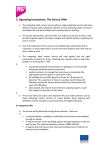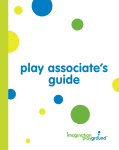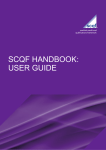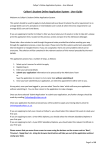Download 21. Next Step Operating Instructions: Terminology
Transcript
21. Next Step Operating Instructions: Terminology Term Achievement Description / Notes Customers’ take-up of education, training or employment. Activity Some form of interaction has taken place with the customer. Please see Appendix B for details of how an activity is recorded in the CRM. Advice/Careers Usually a longer and more in-depth interaction than the Advice giving of information. It may be spontaneous or prearranged, and may be offered on an individual or group basis, via face to face or contact centre advisers. Avoid careers guidance. Adviser/Careers Those employed directly by the Prime Contractor, Adviser Contractor for the Telephone channel or sub contractor to give information and/or advice on careers and skills. This activity may form all or part of their usual work roles and covers all channels in the service. Always to be written as adviser, avoid advisor. Please note just the term adviser can be used if used in context with careers e.g. ‘Book now for a careers advice session. Your adviser will help you to…..’ Age range of services The service is available to all adults in England. Any adult aged 19 and over (or 18 and over for Jobcentre Plus customers or those in custody) will be able to receive personalised help and support. At a distance from Adults who are not in receipt of benefits but who are not the labour market working and who are interested in returning to the labour market. Barriers to Personal or practical barriers which hinder a customer’s participation ability or willingness to participate in education, training or employment. Booked appointment An appointment booked by the customer or by the JCP adviser or Next Step adviser. Call me service The facility to request a call back from an adviser via the website. If used in mid sentence in web copy all lower case. Capability and Tools The web capabilities (e.g. to build a CV) which the service will provide to support the delivery of skills-based advice. Carer A carer spends a significant proportion of their life providing unpaid support to family or potentially friends. 1 This could be caring for a relative, partner or friend who is ill, frail, disabled or has mental health or substance misuse problems.” This definition is subject to review and consultation by the Dept of Health. Complementary support services Agencies offering specialist support, for example in counselling, housing assistance or debt management to which contractors or subcontractors refer customers. Common Inspection The inspection framework for all publicly funded learning Framework provision administered by the Office for Standards in Education (OfSTED). Contact Centre The contact centre is run by the Contractor that provides information and advice via the telephone, email and forums. Avoid using the terms call centre, advice line, helpline. (Next Step) Course Customers wishing to engage in learning are able to search Directory for the course which is right for them through the use of the new Next Step Course Directory, which will support them in making the decisions which are right for them. If used in web copy it is possible to also use the course directory. Course search The facility to search for a course via the course directory available on the web channel. If used in web copy in mid sentence use course search. Avoid Course Search. Customer An individual who accesses the service. Not citizen, caller, client or enquirer. Please see Appendix B for details of how a customer is recorded in the CRM. Customer Experience What a customer hears, sees and feels when interacting with the service. Linked to the Customer Experience Framework which describes how the service provides a blend of capability and tools to personalise the interaction based on the customer profile and needs. See Service Standards. Customer Need A customer want or need and the fulfilment of that need, which enables us to understand how the service will respond. The customer’s experience differs depending on the customer profile and the desired outcome. Customer Profiles Attributes (personal data e.g. age, characteristics e.g. skill level and attitude) to describe the customer and allow us to personalise the service they receive based on who they are. Customer A solution which enables a single view of the customer Relationship across the channels, enabling the capture of contact 2 Management System history and the management of Skills Action Plans. (CRM) Economically inactive Of working age and not employed, not claiming benefits, not self employed, not actively seeking work or in full or part-time education. Ethnic minorities A group that has different national or cultural traditions from the majority of the population and who may be at a disadvantage because they are given unequal treatment. Email an adviser The facility to email an adviser via the website. If used in mid sentence in web copy all lower case. Employment, Employment: The total number of employees, selfEmployees , Selfemployed, participants in government training schemes, employed, Employed and people doing unpaid family work. and Unemployed Employees: Those who work for an employer under the terms of a contract of employment, whether it is written down, agreed orally or implied by the nature of the relationship. Self-employed: Earning one's livelihood directly from one's own trade or business rather than as an employee of another Employed: In full time, part time paid work or self employment. Registered Unemployed: In receipt of Job Seekers Allowance (JSA) or Employment and Skills Allowance (ESA). External Funding bodies, other providers and other organisations organisations with which providers or contractors interact for the benefit of customers, other users and the adult careers service. Face-to-face The face-to-face channel consisting of advisers in a range (channel) of locations across England. Use hyphens. Never abbreviate f2f or similar. Face-to-face advice but advice face to face. Facing redundancy A customer who has either received notice of redundancy or has concerns that they are in danger of being made redundant. Follow up The formal follow up process is when customers are contacted for customer service purposes and to find out if they have entered learning, training or work. Follow up will commence after one month of inactivity of the customer from the date of the last advice session and then a further two months after that. Full time education Learning which is 16 hours or more per week. Guiding Principles A defined set of ‘rules’ that will shape how the service is 3 information Informed Consent Integrated Employment and Skills offer (IES) Interaction designed and delivered. The provision of information about learning or work. TBC A joint DWP, SFA and BIS initiative to more closely align the provision of skills to the ability to progress in work. A single touch point or experience between a customer and the service Intervention An enquiry, case or problem for which the customer has requested support from the Next step service. Please see Appendix B for details of how an intervention is recorded in the CRM. Jobcentre Plus Jobcentre Plus is a government agency supporting people of working age from welfare into work, and helping employers to fill their vacancies. Avoid JobCentre Plus or JCP Key Performance A set of measures that demonstrate the achievement of Indicators and Impact the service against defined National Targets. Measures Labour Market National, regional and local information and analysis Information (LMI) about current and future labour markets. In copy use labour market information but if abbreviated use LMI. Language lines The provision of information and advice in eight languages; Gujarati, Punjabi, Sylheti, Urdu, Farsi, Polish, French, and Somali. In copy use language lines mid sentence. Avoid minority language service. Length of This is classified into the following headings: unemployment - less than 6 months - 6 – 11 months - 12 – 23 months - 24 – 35 months - over 36 months - not known/not provided. Low skilled - adults who lack a level 2 qualification and/or will be in low skilled, low prospects jobs -adults who experience barriers within the labour market; -adults lacking ‘employability’ skills and those needing more in depth support to enable them to progress into training or sustainable employment. Matrix Standard The required quality standard for all providers offering funded careers skills and advice services. Methods of follow up This can be conducted via telephone, e-mail, face to face, letter, or text/SMS for all service offers. 4 Next Step personal online space Formerly Skills Accounts. Part of the Next Step customer website where the customer registers to access information and tools to help them progress in life and work. OLASS Offender Learning & Skills Service (Not in scope currently but will come into scope beyond). Outcome Focussed A focus to ensure that every interaction has a clearly (as described in the communicated outcome which will support customers in Guiding Principles progressing in work and life. Outcome payment An outcome payment that is payable when individuals enter learning and/or skills training or sustainable employment. For face-to-face prime contractors documentary evidence is required to claim the outcome payment. Part-time education Learning which is below 16 hours per week. Personalised Based on the Customer Experience Framework the service will use a blend of capability and tools to provide an appropriate outcome based on the customer profile and needs. Positive outcome Prior qualification level Priority Groups Advisers work with customers to ensure that they achieve one of the following: (a) enter learning or training (b) progress in work or (c) move into sustainable employment (see definition below). Entry level Other qualifications below level 1 Levels 1 through to 8 Other qualifications Not known/not provided No qualifications. Priority groups identified for Next Step: - low skills adults(without a level 2 qualification), especially women locked in low skilled, low prospects jobs - young adults aged 19 - 24 without a level 3 qualification - adults facing redundancy, newly redundant or at a distance from the labour market - Adults aged 50 plus - Jobcentre Plus customers in receipt of out of work benefits - people with learning difficulties or disabilities (including those with mental health issues) - offenders in custody and in the community under the supervision of probation services and ex offenders - people from ethnic minority communities 5 - carers as defined by Department of Health guidelines.(See carer above) Prime Contractor The contract holder responsible for the delivery of the careers and skills information and advice offer. The term Prime Contractor includes the contractor leading on the delivery for the contact centre. Process A series of steps/activities to document a workflow and derive an appropriate outcome. Progression A customer moving forwards in work and life either by finding employment, receiving training or progressing in their existing job. Provision A specific type of activity. These are: - programmes for the unemployed - Apprenticeships - Informal Adult Learning (IAL) non accredited learning - Further Education (FE) - Jobcentre Plus funded provision - Learndirect provision - Higher Education (HE) - UnionLearn. QCF (Qualifications A framework which breaks all qualifications into and Credit manageable units and credits which are recognised by Framework) providers, learners and employers. Qualification level – - Entry level certificates Entry - Skills for Life at entry level. Qualification level – 1 - GCSEs grades D-G - BTEC Introductory Diplomas and Certificates - OCR Nationals - Key Skills level 1 - NVQs - Skills for Life. Qualification level – 2 - 5 GCSEs grades A*-C - BTEC First Diplomas and Certificates - OCR Nationals - Key Skills level 2 - NVQs - Skills for Life. Qualification level – 3 - A levels - Advanced Extension Awards - GCE in applied subjects - International Baccalaureate - Key Skills level 3 - NVQs - BTEC Diplomas, Certificates and Awards 6 - BTEC Nationals - OCR Nationals. Qualification level – 4 - Key Skills level 4 - NVQs - BTEC Professional Diplomas, Certificates and Awards - 1st year BA degree. Qualification level – 5 - HNCs and HNDs - NVQs - BTEC Professional Diplomas, Certificates and Awards - 2nd year BA degree. Qualification level – 6 - National Diploma in Professional Production Skills - BTEC Advanced Professional Diplomas, Certificates and Awards - 3rd year BA degree. Qualification level – 7 - Diploma in Translation - BTEC Advanced Professional Diplomas, Certificates and Awards - Masters degree. Qualification level – 8 - Specialist Awards - PhD. Referral to or from A formal process takes place when a customer is referred to or from one organisation to another with a booked appointment, e.g. to Jobcentre Plus. To support the referral there will be a sharing of customer information. Scenario A specific example used to test the customer experience by providing a “real-life” sequence of events. Service Level A service level is a measurement of performance which relates specifically to a channel or region. Service Standards A document which sets out from a customer perspective what they want from the service and then demonstrates and measures how we will deliver this to them. Session This can be a completed activity with a face-to face adviser or an interaction between a customer and adviser at the contact centre. Please see Appendix B for details of how a session is recorded in the CRM. Signposting to or This is a less formal process than a referral. A customer is from told or given a leaflet about the service or another organisation that could help i.e. if specialist advice is required. Skills Action Plan A written record of an interaction which lists the main points discussed and the actions which the customer and the adviser have agreed to carry out. This will be recorded in the CRM. . If used in mid sentence in web copy all 7 lower case. Can also be referred to as action plan (lower case). Skills Health Check TO BE USED FROM THE LAUNCH OF THE NEW WEBSITE ONWARDS. This is a universal skills diagnostic tool designed to provide a coherent and flexible approach to skills assessment and personal action planning. The outcome of the assessment is a report which a customer could act on by themselves or go onto discuss the report with an adviser. In web content use skills health check to describe the process and skills health check tool when referring directly to the tool. Soft outcomes Soft outcomes refer to achievements for a customer which aren’t measurable, such as increased confidence, selfawareness and motivation, the ability to overcome barriers to participation, the identification of clear goals, and knowledge of opportunities and sources of support. Sub contractor Agencies formally contracted to the Prime Contractor to deliver the service on their behalf. Sustainable Employment of a minimum of 13 weeks duration is employment required for Face to Face outcome payment for sustainable employment. The Jobcentre Plus the definition is staying in work for 6 months, i.e. for individuals to leave, and remain off benefits, for 6 months or more. Telephone (channel) The telephone channel delivered by advisers in two locations; Manchester and Leicester. Transfer This relates to the internal handover of a customer between the three service channels. Universal Service Vision Web (channel) Workforce The universal service describes the core offer (Information, support and advice to support progression in work and life) of the service which is available to all adults within England. The vision is articulated as “Our vision is for millions of people to enjoy more rewarding lives. We want to create a culture where career development and acquiring new skills is the norm. This will improve individuals’ lives, society as a whole and in turn increase productivity and boost the economy.” The web channel for the service comprises the customer website (i.e. the virtual adviser) with a range of tools and capabilities to support advisers and customers. Ensuring that the workforce has the skills and capabilities 8 Development required to deliver the service both for Destination 1 and beyond. Additional words/terms for web copy Term Description / Notes £30 a week Not £30 per week A level Not A-level or A Level Academic Consider whether ‘theoretical’ would get the point across better in the context Adult Certificates NOT: National Certificates, National Tests, Online Tests. for Numeracy and NOT: Adult certificates for numeracy and literacy Literacy Assetskills Apprenticeship Always capitalised. But apprentice or apprentices would be lower case Automotive Skills Collective nouns Computer Next Step is singular. Next Step has introduced a new action plan…..' Avoid PC Courses Avoid ‘products’ and ‘learning materials’ CV builder Not CV Builder Directgov Not Direct Gov, DirectGov Distance learning Refer to home study/self-study e-learning Always lower case except at the beginning of a sentence email Not e-mail or Email Fees waived/fee remission GCSE Use ‘get your fees paid’ Not G.C.S.E. Health Learning and Skills advice 9 line higher education and further education Industryrecognised internet italics job profiles General terms – all lower case Not ‘accredited’ Always lower case unless at the start of a sentence. Avoid web unless in relation to the web channel. Use for titles of publications Guide to employment rights. (Note: do not use quotation marks as well) Always lower case except at beginning of a sentence learning opportunities learning provider May be used instead of courses Level 2 qualification Mature students Not level two qualification Next Step If referring to the brand. Upper case N and S and space in between words – Next Step Used as part of a sentence e.g. ‘we can help you take your next step’. Never nextstep. next step Instead of educational establishment Use older students NHS Careers offers / offer SEMTA offers information and advice on-the-job Hyphenated on-the-job training but training on the job one-to-one Hyphenated online Not ‘online’ Over 50s Use older people/workers/learners part-time and fulltime ‘Personal circumstances’, when describing domestic commitments Podcast Hyphenated Also use ‘financial circumstances’ to describe financial position. Better than ‘situation’ Not audio file 10 Professional and Not Career Development Loan Career Development Loan Sector Too business-like; use industry, field or nothing at all, eg in financial services…. Sector Skills Never SSC. Council Self-employed Hyphenated self-study Hyphenated SEMTA Not Semta Skills for life Not basic skills, essential skills SkillsActive Not Skillsactive, Skills Active Skillset Careers Not SkillSet Careers, Skillset careers Skillsmart Retail Not SkillsSmart Retail, Skillsmart retail Strengths Not aptitudes, abilities or talents SummitSkills Not Summit Skills, Summitskills Subject names Course subjects in lower case, apart from English, which is a proper noun. General terms, such as university courses in engineering, in lower case too; unless talking about a specific course of a specific university such as Biochemistry at Durham University. Always capitalised Titles of official schemes and initiatives – e.g. Adult Learning Grant, Professional and Career Development Loans UK online centre NOT: UK online Centres or UK online (s) Vocational ‘Practical’ or ‘work-related’ would get the point across better in the context Volunteering Not voluntary work 0800 100 900 Note spaces and bold. 11 Legacy terms - NOT TO BE USED Term Description / Notes Advice line Use telephone channel/contact centre as appropriate or in web copy avoid using any descriptor and for example say ‘Call us…’ or ‘Call an adviser…’ Use adviser/careers adviser Careers coach Differentiated and Use advice session Personalised (DAPS) Guidance/careers Use advice/careers advice guidance Helpline Use telephone channel/contact centre as appropriate or in web copy avoid using any descriptor and for example say ‘Call us…’ or ‘Call an adviser…’ Information Use adviser/careers adviser adviser Learning adviser Use adviser/careers adviser Minority language Use Language lines/language service service National Directory Use Next Step course directory. of Learning Providers and Provision (NDLPP) Skills Accounts Use Next Step personal online space Skills diagnostic tool Use ‘skills health check tool’ refer to the process as a ‘skills health check’ 12 Operating Instructions: Terminology Appendix B Definitions relating to the Customer Relationship Management system Activity: Is used to record the fact that some form of interaction has taken place with the customer. An Activity record within CRM can be seen as a “Phone Call”, “Email”, “Task”, “Service Activity”, “Letter” or “Fax”. For example, if ‘Joe Bloggs’ were to call the contact centre about his intervention “Getting back into work” (as described above), a new “Phone Call” activity would be created within CRM which is linked to the original Intervention record. If Joe then gets referred to the face to face team, then a “Service Activity” would need to get created which has a service type of “Face to Face Appointment”, outlining the start and end time of the appointment and which adviser he will be seeing. Customer: An individual who accesses the service. This is recorded as a Contact within the CRM system and describes the details held about an individual including contact details, address details and demographics. This is a container for all other records within the CRM System specific to this person. Intervention: A problem, enquiry or case for which a customer has requested support from the Next Step service. This is recorded as an Intervention within the CRM System. A customer could have many Intervention records open at one point in time relating to each different issue they may have, however, most of the time they will have only one. For example, an intervention could be created within CRM to record the fact that “Joe Bloggs” is looking to get back into full time employment after being unemployed for 18 months. This intervention could remain open indefinitely as the adviser may never find out if and when Joe Bloggs gets back into work. Interventions will not be used for counting customers and customer sessions, they are used to understand why a customer is contacting the service and manage them through the service. Session (Face to Face): Is a completed activity with a face to face adviser. In CRM, this is recorded as a Service Activity of type “Face to Face Appointment”. In order to be paid for, the Service Activity must be marked as “Completed” within the CRM system. Session (Telephone - Information): Is an interaction between a customer and a first (information) tier adviser at the contact centre. This is recorded in the CRM as a phone call activity. 13 Session (Telephone - Advice): Is an interaction with a second (advice) tier) adviser at the contact centre with an associated action plan. This could be recorded within CRM as a phone call activity, if the call is transferred immediately OR as a service activity of type ‘careers coach call back’ if a call back is scheduled. 14


























